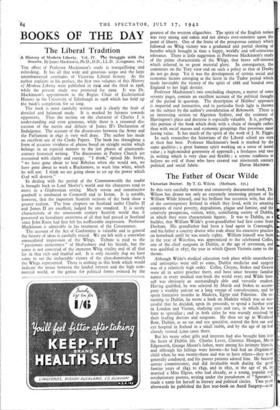BOOKS OF THE DAY
The Liberal Tradition
THE effect of Professor Mackinnon's study is tranquillising and refreshing. It has all that wide and generous scope and the large unembarrassed certitudes of Victorian Liberal history. As the author explains in his preface, the first two volumes of this History of Modern Liberty were published in 1906 and the third in 19o8, while the present study was promised for 1909. It was Dr. Mackinnon's appointment to the Regius Chair of Ecclesiastical History in the University of Edinburgh in 1908 which has held up the hook's completion for so long.
The book is most carefully written and is clearly the fruit of detailed and balanced study. It is marked by fairness towards opponents. Thus the section on the character of Charles I is understanding and even generous, while there is a reasoned dis- cussion of the merits and defects of James II's Declaration of Indulgence. The account of the dissensions between the Army and the Parliament in 1647 is very well done. The author has made an excellent use of the Clarke Papers. The book has throughout a form of accurate vividness of phrase based on straight recital which belongs in an especial manner to the last phases of nineteenth- century historical writing. The discussions in Putney Church are recounted with clarity and energy. "1 thmle," opined Mr. Sexby, "we have gone about to heal Babylon when she would not, we have gone about to wash a Blackamore, to wash him white, which he will not. I think we are going about to set up the power which God will destroy."
In dealing with the period of the Commonwealth the reader is brought back to Lord Morley's world and the characters tend to move in a Gladstonian setting. Much serene and constructive goodwill is attributed to Cromwell and to Ireton. It is notable, however, that the important Scottish sections of the book show a greater realism. The four chapters on Scotland under Charles II and James H are excellent, judged by any standard. It is surely characteristic of the nineteenth century Scottish world that it possessed an hereditary awareness of all that had passed in Scotland since John Knox had first left his ineffaceable impression. Professor Mackinnon is admirable in his treatment of the Covenanters.
The account of the Act of Conformity is valuable and in general the history of ideas is carefully traced. We are left with a somewhat emasculated impression of the Whigs. Tribute is paid to the "passionate earnestness" of Shaftesbury and his friends, but the sense is not conveyed of the immense Whig vitality and of all that lay in that rich and fruitful soil It is only recently that we have come to see the ineluctable victory of the class-dominance which the Whigs represented. There is nothing in this book which would indicate the nexus between the landed interest and the high com- mercial world, or the genius for political forms evinced by the greatest of the western oligarchies. The spirit of the English nation was very strong and oaken and not always over-sensitive upon the point of liberty. One of the fruits of the prosperous century which followed on Whig victory was a graduated and partial sharing of benefits which brought in time a happy, worldly and self-conscious tolerance. There is little suggestion in Professor Mackinnon's study of the prime characteristic of the Whigs, that brave self-interest which ushered, in so great material glory. In consequence, the comments on the Tory view and on such a policy as that of Danby do not go deep. Yet it was the development of certain social and economic factors emerging at the latest in the Tudor period which made inevitable the victory of the spirit of 1688 and handed over England to her high destiny.
Professor Mackinnon's two concluding chapters, a matter of some seventy pages, contain an excellent account of the political thought of the period in question. The description of Hobbes' approach is impartial and instructive, and in particular fresh light is thrown on the subject by the author's consideration of Behemoth. There is an interesting section on Algernon Sydney, and the estimate of Harrington's place and doctrine is especially valuable. It is, perhaps, this portion of the book which deals with a chain of thought rather than with social masses and economic groupings that possesses most lasting value. It has much of the spirit of the work of J. N. Figgis.
In such researches the historians of the Liberal school are seen at their fine best. Professor Mackinnon's book is marked by the same qualities ; a great humane spirit working on a sense of moral value ; a high-minded generosity of approach ; a freshness and ease in writing which is very clear and flexible; a serene readiness to believe no evil of those who have created our nineteenth century


























 Previous page
Previous page